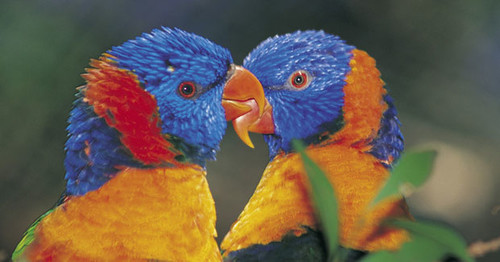Parrots intoxicated by a mystery substance are dropping out of the sky near Darwin.
 Red-collared lorikeets range from The Kimberly coast to the western margins of the Gulf of Carpentaria (Credit: Mitch Reardon)
Red-collared lorikeets range from The Kimberly coast to the western margins of the Gulf of Carpentaria (Credit: Mitch Reardon)
SEEMINGLY DRUNKEN AND HUNGOVER parrots are dropping out of the sky in the Northern Territory and experts are at a loss to explain why.
The red-collared lorikeets lose coordination and pass out after eating a mystery food, Lisa Hansen, of the Ark Animal Hospital at Palmerston, near Darwin said on Thursday. Red-collared lorikeets are an NT subspecies of the rainbow lorikeet (Trichoglossus rubritorquis).
"It happens every year around this season, they lose all balance and we find them fallen out of trees and the sky," she says. "Unless someone intervenes, they can't fly and will get picked up by predators."
Unable to function
"It seems that the birds get intoxicated by something they have eaten and it renders them unable to fly and function... they can get very sick as a result." Around eight to ten birds a day have been brought to the hospital after falling to the ground in backyards and along roadsides. There are now a total of 40 lorikeets receiving treatment.
"We are fairly certain it's a plant, but we don't know which plant. People talk about seeing drunken birds under umbrella trees when they are flowering," says Lisa. "However, most say those birds recovered and flew away afterwards. That is not happening to these guys... sometimes they need intensive care before we can put them out in the aviaries."
It can take up to four weeks for the animals to make a full recovery, at which point they are released back into the wild. Hospital vets have speculated that a plant is causing the lorikeets to become intoxicated, but tests have not yet identified any particular toxin.
Mild poisoning
Chris Tzaros, an ecologist and parrot expert at conservation group Birds Australia says he has had similar experiences with musk lorikeets, which are common in south-eastern Australia.
"Those birds become drunk on eucalypt nectar. They feed in some blossom, and then fall out of the blossom, disoriented to the ground," he told Australian Geographic. "These birds evolved to feed on eucalypt nectar all day long, everyday. It might be a particular time of the year when the nectar ferments or a particular tree which affects the birds."
He suggests that if the red-collared lorikeets are taking three to four weeks to recover, it could be something more sinister such as mild poisoning. "I have not heard of anything like that, and it could be really interesting to observe what they are feeding on," Chris says. "People who see and pick up sick lorikeets should try to observe the dietary items the birds nearby are foraging on."
"They are magnificent creatures and I wouldn't like to see us losing them over some mystery plant," says Lisa. "So far, the numbers [of sick] are a small proportion of the birds living in the wild, but who knows what the future will bring?"